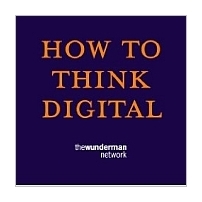ANALOG MARKETERS, YOUR CAREER IS OVER
A lot of people are terrified of digitization. TV executives are wondering whether their
stations have a future. Newspaper barons say their industry is 'in freefall'. A generation
of advertising executives are sensing thattheir career is in the toilet. At Wunderman
though, we have no such concerns. We have a very clear appreciation of what digitizationis
bringing to marketing. This book sets out our perspectives, observations andour
insights.They are based on web analytics, user observation and hard, current data.You may
of course choose to disagree with them. And stick with the analog marketing principles you
have grown up with. But those principles come from a world that no longer exists. And they
were created to direct media choices that are no longer possible. So to stick with them if
you will. But you will be making the same choice that losing generals have been making for
centuries. To march into the next war, intending to fight the last.
SUMMARY
The analog world is dying, as highly segmented brands find it more and more difficult
to connect with narrow target audiences via blunt mass media and as consumers spend more
and more money on devices and services that eliminate advertising from their lives. (page
5) But marketers are struggling to adopt digital because what it does looks to them
nothing like marketing. But that's because the concept of marketing was first coined in
1960 to explain the effects of cheap, mass television. Marketers didn't select TV as their
medium of choice. Marketing was invented to explain the effects of cheap TV. (page 9)
To think digital, marketers need to completely erase what is in their heads.
They then need to use the following principles:
1. Most analog marketing hits the wrong people, or the right people at the wrong time.
Digital is more efficient and more impactful because it can hit only the right people, and
only at the right time. (page 14)
2. There are many digital media. But the most powerful is digitally enhanced word of
mouth. Use it with care though - you can't use it to buy your way to success. (page 21)
3. In the analog era, marketing was about getting people to think things so they might do
things. Digital media are interactive, so now it's the otherway round. Marketing is now
about getting people to do things. (page 27)
4. There's no point using really smart search marketing if you don't spend as much time
thinking about what happens after the click. (page 31)
5. No consumer will wait 10 seconds for a brand website to download. Keeping people
waiting is a sin. (page 36)
6. Most marketers are dataphobes. And with good reason. Digital data streams can paralyze
marketing departments unless they are handled expertly. So handle data with care. (page
40)
7. Digital media will continue to evolve rapidly for the next twenty years. So don't wait
for the dust to settle. Marketers need to adopt a permanent beta mentality in their
marketing planning. (page 45)
8. Why find a new customer when you already have one. Smartly managed, digital
relationships can last a lifetime. (page 54)
9. In the digital era, all brand owners are also media owners. Save media money and
find the perfect partner. (page 59)
10. Web 2.0 is all about consumers working together. Work out how to collaborate with them
too in the channel of we. (page 66)
11. In the analog era the point of much marketing was to encourage consumers to trial a
product or service. In the digital era, we can be more direct. Trial can be our
startpoint, not our endpoint. Experience is the best form of marketing. (page 75)
12. Handle privacy issues carefully. You don't need tons of information about a consumer
to influence them. Quite often, all you need is one key piece of information. (page 80)
13. Digital media are already much more efficient than analog media. But Web 3.0 and Web
4.0 will be much more efficient yet again. Digital media need to evolve. (page 87)
14. Work on predicting the future. Marketing and media are now moving faster than you
think, and much faster than your company can respond to. (page 94)
15. Build a closer relationship with the truth. Because in the digital era, the people who
tried your service yesterday are talking to those who are trying it tomorrow. (page 100)
16. The consumer has worked out how to use the internet to cut marketing out of their
decision making processes faster than marketers have learned how to use it to stay in
control. So the consumer is in control - for now. (page 104)
17. There is a lot more demand to be had for products and services that can be delivered
instantly than for things people have to wait for. (page 108)
18. Boring isn't boring at the moment of truth. This is vital news for the financial
services and life insurance companies that have seen their marketing more than anyone
else's ignored by empowered consumers. (page 113)
19. The world is globalizing slower than you think. Localization is much, much more than
just translation. (page 116)
20. Many things were better when they were analog. Just because it's digital doesn't mean
it's better. (page 120)
21. 'All warfare.' said Sun Tzu, 'is based on deception.' In the analog era, everyone's
marketing strategy was obvious. Not so today - so keep yours secret. (page 124)
128 pages, Paperback
Księgarnia nie działa. Nie odpowiadamy na pytania i nie realizujemy zamówien. Do odwolania !.


